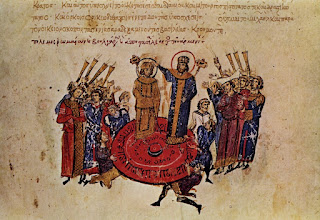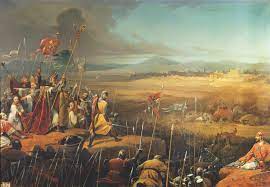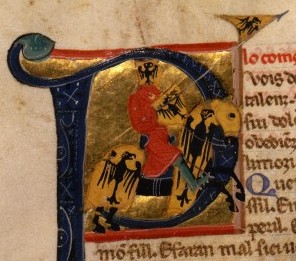His father had switched sides during The Anarchy, and William briefly became a hostage in a situation that almost led to his death. He survived, and was sent to Normandy to train as a knight under his mother's cousin, William de Tancarville. We learn about his early life and training from a biography, Histoire de Guillaume le Maréchal, the only known biography from the Middle Ages of someone who was not royal.
He grew tall (six feet), and ambitious (his nickname was "Greedy Guts"), and then his father died, leaving him no money. He took his martial skills to tournaments, showing off his prowess and gaining wealth through victories. In 1170 he was appointed to the household of Young King Henry, son of Henry II. William managed Henry's tournament team and kept an eye on Henry to prevent his capture by the other side; together they won many tournaments.
Something caused them to fall out—maybe because he was accused of having an affair with Young Henry's wife, or because at Henry II's request he fought on the side of Richard when the Young King rebelled against his father—and William was "traded" to Henry's rival, Philip of Flanders, but that change was short-lived. When the Young King died of dysentery on 11 June 1183, William was by his side. Henry had made a pledge to go on Crusade, and William undertook the journey on his deceased friend's behalf, carrying Henry's cross to Jerusalem where he spent two years fighting with the Templars.
Returning to England, William stayed with King Henry, leading his soldiers against a rebellion caused by Henry's son, Richard Lionheart. William met Richard in battle and unhorsed him. Henry died shortly afterward, and Richard (who admired martial ability) gave the 43-year-old William a wife: the 17-year-old Isabel de Clare, heiress to several estates. This made William the de facto Earl of Pembroke, so he finally had a title. Richard also made William Regent while Richard went on crusade, and had William lead his armies against France.
After Richard's death, William remained in service to King John, and then was Regent for John's son Henry III. Along with the Young King, William served a total of five kings in England. Finally, in his early 70s, his health began to decline. On his deathbed he said "I cannot defend myself against death." He passed away peacefully on 14 May 1219.
He had several children with Isabel de Clare, one of whom did not share his father's loyalty to the crown, as I will explain tomorrow.



























